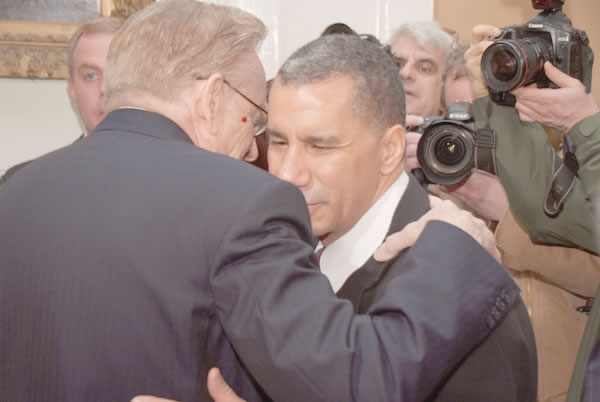By Josh Rogers
Gov. David Paterson ignored his difficulties in a speech to a Wall St. group Wednesday but he did play public peacemaker in the long-running World Trade Center dispute, saying he was optimistic a deal would be made.
He offered no defense of his actions, but he had a strong one for Wall Streeters whom he said have been hurt by lots of negative publicity.
Almost no one in the audience at Bayard’s stood up to ask a question, and the governor did not even hint at the time he is spending defending accusations in the criminal investigation into his intervention in a domestic violence case, or regarding a state ethics ruling that he testified falsely under oath about his intention to pay for Yankee World Series tickets.
Julie Menin, chairperson of Community Board 1 and a member of the Wall St. group, the Downtown-Lower Manhattan Association, said much of the talk in the room before the governor’s speech was over whether he could still govern or should he resign, but she was not surprised that no one asked him about it.
“I think people are stunned by the developments of what’s happened in Albany,” she said. “Normally there are actually a lot of questions at something like this.”
The one audience question came from C.B. 1’s vice chairperson, Catherine McVay Hughes, who wanted to know what Paterson was doing to resolve the W.T.C. dispute.
Paterson, who had been highly critical of developer Larry Silverstein’s offer to the Port Authority several months ago, said “I think all sides have put real and tangible offers on the table. So how do you describe that – cautiously optimistic – that’s where I’d say we are. Would you say that Larry?”
“I’d say that,” said Silverstein who was sitting a few feet away from the governor. Paterson then got the same response from Tim Gilchrist, who is representing the governor in the negotiations.
“Maybe with the disinfectant of public scrutiny we should just sit down right here and work it out right now,” Paterson said, drawing applause and laughs.
He said the state and the Port, which owns the site, had to offer Silverstein more assistance to reconstruct offices at the site, but all sides are in a tough position because of the economic downturn. The Port and Silverstein are supposed to return to the arbitration panel at the end of the week with a framework of a compromise.
Silverstein was one of the first to embrace Paterson after the speech. He declined to comment as he left.
Chris Ward, who was tapped to lead the Port by Paterson, said immediately after the speech: “We are working around the clock…We are talking and making progress but it’s too soon to say there will be a deal.”
Ward also chatted amicably Wednesday with Janno Lieber, president of Silverstein’s World Trade Center Properties. It looked to be a sharp contrast to the heated charges and countercharges the pair have exchanged the last year.
Menin said Paterson hit the right notes in the speech, but his troubles are clearly a distraction to the W.T.C. impasse. Getting everyone in the same room to solve things has been tried unsuccessfully many times before, she added.
“If I had a nickel for every single speech or press conference or groundbreaking that I’ve been to and someone has said ‘oh we gotta get the parties together, we gotta do the right thing’ — we’ve got to have action,” she said. “This is a national disgrace. We are here eight years later with this hole.”
Paterson’s short, 14-minute speech touched on some Lower Manhattan issues but he focused on the tough choices ahead closing the state’s $9 billion deficit. He said New York is not resorting to the deeply painful cuts made in many other states such as eliminating early childhood and pre-K programs, shortening the school week down to four days and closing libraries.
Paterson said Wall St. excesses should be dealt with, but investment firms provide 22 percent of the state’s tax revenue and “the public relations battle” over bonuses has prompted many firms to switch from cash to stock options, costing the state $600 million.
The D-L.M.A. was founded by David Rockefeller and the Wall St. crowd of about 125 gave Paterson its heartiest applause after the governor’s passionate defense of The Street:
“We are strongly in support of Wall St….They don’t abandon automobiles in Michigan. They don’t abandon grapes in California, they don’t abandon oil in Texas and we shouldn’t run away from the engine in our economy.”
Josh@DowntownExpress.com





























